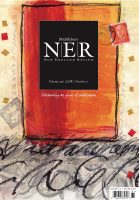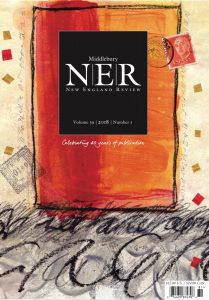
Jeff Martin, author of “Leave a Message” (NER 39.1) talks with NER editorial panel member Evgeniya Dame about anger and righteousness, the power of good research, and the books that break his heart.
Evgeniya Dame: What made you turn to Chinese culture in the writing of this story?
Jeff Martin: In the fall of 2013 one of the lead news stories was about the smog in northeastern China, specifically in Harbin—it was so bad that buses got lost on their routes, schools had to close, flights had to be rerouted; they called it the “Airpocalypse.” The pictures from Harbin’s streets astonished me because they were ghostly in a way that fog alone isn’t—the smog seemed more hellish or malevolent than eerie (maybe because there’s a human element to it) and it lent itself very naturally to the setting for a story, particularly one that might in some way be about hell. Prior to “Leave a Message” I’d never written about Chinese culture, so this was also a good chance to do some really interesting research.
ED: Wen is a fascinating character harboring incredible anger. What are your thoughts on anger and violence? Is this familiar territory for you as a writer?
JM: A few nights ago I re-watched L.A. Confidential for the first time in years, and in the opening scenes, Bud White, Russell Crowe’s character, watches through the front window of a house as a man beats a woman. White’s an off-duty police officer on his way to a Christmas party at the station, and he does exactly what I hoped he’d do—he lures the man into the yard, hits him hard six or seven times, tosses him into the bushes, handcuffs him to the porch railing, threatens his future. It’s immensely satisfying to watch, not only because White’s anger is so clearly just and so clearly righteous, but also because his actions feel so instinctively right—the abusive husband is violently out of line. Men shouldn’t be violently out of line; those who are need to be punished, sometimes violently. My response to White’s actions is visceral, even primal—there was an imbalance in the world, now there’s not.
It’s the righteousness that complicates. At that moment in the movie, I can’t imagine too many people not feeling a little soul-gust of triumph at White’s righteous anger. In my story, Wen thinks he’s righteous—he feels maligned, first by Mr. Zhang, then by the contractor he ultimately attacks; he perceives an imbalance in his world that must be restored, and the only way he knows how to resolve the rage is with violence. I certainly don’t cheer for Wen. The dangers of righteous anger seem particularly alarming in America right now.
I’m no more immune to anger than anyone else. It’s familiar territory for me as a writer because it’s familiar territory for me as a person, and though my anger may derive from a somewhat unusual place—a forty-year dispute with God—its foundation is the same as anyone else’s, the profound sense that things are not as they should be, and that I know how to restore the balance. In my stories, the poor characters then have to suffer through said dispute by spending most of their time trying to enact justice in a world they perceive as terrifically unjust. Many of them are angry about something, which means many of them are in one hell or another.
ED: While reading “Leave a Message” I admired the way the specific details of Harbin—the Ice Palace and the heavy smog —found their place in the story alongside more familiar, personal details, such as Yining’s obsession with taking photos or Wen’s rage at being fired. How do you find the balance between the familiar and the unfamiliar in your writing?
I’m mostly a homebody—I’ve been out of the country only twice, and one of those trips was to Niagara Falls, which barely qualifies as “out of the country.” This is just to say that the vast majority of the world is unfamiliar to me, though I think that’s good because it makes me curious. When I get curious, I do research, and that’s where I find details that will hopefully make the story familiar enough for readers to feel they’ve been in a particular place for a bit. For “Leave a Message,” I spent a lot of time tracking down images of Big World, studying Google Maps of Harbin, and reading articles about the “Airpocalypse.” It’s the best way I can write about a “big idea” like rage or hell—I have to hang it on a lot of precise details to keep it grounded.
ED: In the last scene, Wen’s vision of two gloves floating in the air, tearing fingers off each other, reminded me of Gogol’s stories, “Nevsky Prospekt” in particular, where clothes, not people, populate the streets of Saint Petersburg. What inspired you in writing this final scene? Did you always know the story would end the way it did?
Endings are often the beginning of a story for me, and then I try to bend the rest of the piece to that final point. In this case, I understood the last scene needed to take place in the smog, that it needed to be strange and disorienting—weird shapes appearing and vanishing in the air—and that the light had to be orange and red—hellish. I showed a draft of it to my writing group a few years later and they argued the ending needed to be even weirder, that maybe the gloves needed to reappear somehow to connect the story’s threads more effectively. Their advice was spot on, as it typically is, and those gloves walking around like crabs still creep me out.
I noticed you frequently use the word “hell” to describe the atmosphere in your story or the situation in which your character finds himself. Writers in the past have offered various personal definitions of hell, not bound by a religious doctrine. I am thinking of Dostoevsky’s “I ponder ‘What is hell?’ I maintain that it is the suffering of being unable to love,” and, of course, of Sartre’s punchy “Hell is other people.” What is yours?
There are so many hells in this world (but also so many heavens) that I’m a bit wary of one-liners that try to encompass them all. Dostoevsky’s line is no doubt right for a great many people, and the suffering of being unable to love one’s self in particular is probably the root cause of history’s greatest atrocities. For instance, I can’t imagine that Hitler loved himself or that ISIS or Klan members love themselves. But surely there are people in Syria right now who do know how to love and are in this moment in the act of loving, but who are also getting bombed and shelled and shot at. That’s a kind of hell that Dostoevsky’s line can’t account for. In the same way, Sartre’s line can’t account for the hell that is physical illness or the hell that dying can create.
I’d add “Anger is hell” to this awful list. It’s not as eloquent or punchy as the first two, and anger may be more of a coping mechanism than a root cause, but it’s certainly a universal hell. It takes almost no effort to create or maintain (just a feeling that something in our lives isn’t as it should be), it invariably does some kind of damage (physical, emotional, or both), and its bedfellows are a truly weird mix of regret, pride, fear, and guilt. Sometimes it actually does get things done in genuinely useful ways—here I think of the movement that has come out of the Parkland school shooting—but mostly its benefits in our lives seem negligible, which is one of the reasons why I can’t accept that we were made to spend our time seething and snapping not just at each other, but at our very own selves.
ED: You co-direct the University of Virginia’s Young Writers Workshop. Can you tell us about your experience working with young people who are in the process of establishing themselves as writers?
JM: I’ve been with Young Writers for eighteen years now, so I could talk about this all day. What I’ve found is that most young writers (high school age students) come to the program with some of the same notions about being a writer that I had when I was their age: e.g., I have to suffer more, I have to write about Big Ideas, I have to publish (note: I did not have this last one). But a few of them know right off the bat that to be a writer means more than just being in a room alone for hours on end; it means being part of a community of other writers, since writing is an admittedly rather strange, self-isolating, sometimes lonely task, and it’s much wiser to take that road with other people.
If there’s a “secret” to the success of Young Writers, it’s likely the close-knit community we create. In two or three weeks it’s unreasonable to expect students will change their thinking about Big Ideas or publishing, but it’s perfectly reasonable to hope they might realize that writers need other people, maybe most particularly when they’re just starting out. When they leave I’m glad they have some new craft tools in their belt, but I’m equally glad that they have new communities of people that can help support and challenge them (and I have no doubt that many of the tears at the end of each session come from students knowing they’re going back to places that don’t have such communities). I talked earlier about my own writing group helping me with this very story, and that’s no exaggeration. Without them pushing me to revise the story again and in a particular way, my guess is that NER wouldn’t have picked it up and we wouldn’t be having this conversation right now.
ED: Could you share with us the writers who have been your major influences? What is it about their work that attracts you?
Between 2003 and 2016 I taught both high school and college English, and for ten years in a row my classes read Tim O’Brien’s The Things They Carried, Zora Neale Hurston’s Their Eyes Were Watching God, and Fitzgerald’s Gatsby. Every year for ten years, with plenty of students happily giving them negative reviews, and these books are still in my all-time top ten. They do several things astoundingly well—break my heart, make me laugh, craft every line, keep it short. That’s extraordinary. As a writer, I should be so lucky.
ED: What are you working on now?
Longer stories like “Leave a Message” are rarities for me these days. Lately I’ve been working with flash fiction, which I like for the austere challenge they provide and the compression of language they demand, though you likely wouldn’t guess that from some of my answers here.
Order an issue of NER today, or better yet, SUBSCRIBE !
!
Jeff Martin has been published in Mississippi Review, Greensboro Review, Sou’wester, and Mid-American Review, among others. He co-directs the University of Virginia’s Young Writers Workshop.
Evgeniya Dame studied English at Samara State Pedagogical University before coming to the US on a Fulbright Fellowship to pursue fiction writing at the University of New Hampshire. Her MFA thesis received the Young P. Dawkins III award, and her work has appeared most recently in Electric Literature. After returning to Russia to teach at Lomonosov Moscow State University for several years, she’s currently completing an MA in Language and Linguistics at UNH. Evgeniya lives in Maine with her husband.
